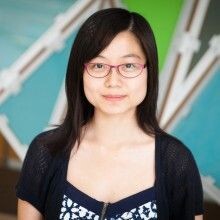Breadcrumbs
- Home
- Current Students
- Undergraduate Students
- Linlei Ye, Pharmacology and Toxicology
Linlei Ye, Pharmacology and Toxicology

The essence of my leadership philosophy is captured by the quote “be natural at heart and new in mind.” I believe with genuine kindness and compassion, leaders are able to connect with people on a personal level and inspire strength. Through learning and collaborating with others, we are able to achieve incomprehensible heights. With an inquisitive and open mind, leaders are able to identify needs and strive to create a tomorrow that is better than today. Throughout my undergraduate career, I have had the privilege of learning from great mentors and working in diverse teams to transform ideas into tangible initiatives that serve to benefit others.
In my first year of university, I learned the value of mentorship. With the support and guidance of my mentor, I was empowered to step out of my comfort zone and be involved in the University College community as a residence council speaker and first year house representative. My enriched experiences motivated me to propagate the mentorship cycle in becoming a mentor myself the next year. My comentor and I connected with 15 students and aided their transition to university through hosting study skills workshops and providing emotional support via one-on-one meetings.
Yet through this process, I recognized some deficiencies in the traditional mentorship model – the relationship becomes more dilute over time as the mentee grows more independent and the mentor exhausts their advice. I believe there were missed opportunities for further engagement and growth. In my role as a two-term Vice President of the Pharmacology & Toxicology Student Association (PTSA), I worked tirelessly with my team to develop an initiative to promote discussions beyond academics and foster stronger mentor-mentee relationships by presenting novel and creative monthly conversation topics. I secured $1200 of funding to support the pilot year of “Coffee Talks.” Now in its fourth year, our comprehensive mentorship program has facilitated over 150 students in their social, academic and personal growth. As the current Co-President of PTSA, I make listening to my teammates my guiding force and seeking improvement a habit. Effective leadership requires integrating the voices and opinions of diverse individuals and embracing humility. This year, my team and I hosted social events, academic seminars and introduced new merchandise designed and voted by the students.
Having learned firsthand the power of teamwork, I have extended my collaborative efforts beyond the University to an international platform. With 8 like-minded peers across 4 continents, we launched an initiative to identify and address barriers in scientific translation. My diverse research experiences – from conducting basic science experiments to performing clinical data analysis to coordinating clinical trials – have made me realize there are inefficiencies in the research pipeline. In hopes of accelerating the bench to bedside process, my team and I have established our mandate, built regional chapters and started examining polices and health systems. Recently, we have acquired funding from the Faculty of Medicine to help translate our goals into concrete, measurable outcomes. Through this project, I embraced a vision fuelled by knowledge of existing problems, tenacity in seeking solutions and compassion for patients who are most in need of treatment.
Leadership starts with asking myself, “how can I make a positive difference in the lives of others?” When helping others becomes a natural mindset, leaders view conflicts, shortcomings and deficiencies as opportunities for growth. Through teamwork and understanding, we are able to generate perpetual momentum to move forward, inspire and empower the hearts and minds of individuals and the greater community.